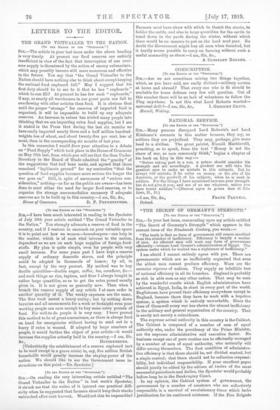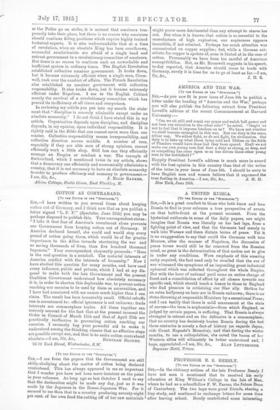"THE SECRET OF GERMANY'S STRENGTH."
[To Tex EDITOR or THE " SFECTATOTt.".] Sin,—In your last issue, commenting upon my article entitled "The Secret of Germany's Strength" which appears in the current issue of the Nineteenth Century, you wrote :- "The truth is that no form of government will rescue mankind from the clutches of inefficiency. Efficiency is largely a matter of men. An efficient man will work any form of government efficiently—witness Lord Cromer's administration of Egypt. The system under which ho worked was a nightmare of inefficiency."
I am afraid I cannot entirely agree with you. There are governments which are so inefficiently organized that even the ablest man cannot produce efficiency. Wars are the examine rigorosa of nations. They supply an infallible test of national efficiency in all its branches. England is probably as rich in able men as any other nation. That may be seen by the wonderful results which English administrators have achieved. in Egypt, India, in short in every part of the world. Englishmen have proved their efficiency everywhere except in England, because there they have to work with a hopeless system, a system which is entirely unworkable. Since the time of Cromwell every war has shown the utmost inefficiency in the military and general organization of the country. That is surely not merely a coincidence.
The supreme actual authority in this country is the Cabinet. The Cabinet is composed of a number of men of equal authority who, under the presidency of the Prime Minister, are the supreme administrative and executive factor. No business except one of pure routine can bo efficiently managed by a number of men of equal authority, who naturally will differ among themselves. The fleet condition of administra- tive efficiency is that there should be, not divided control, but a single control; that there should not be collective responsi- bility, but individual responsibility. If your excellent paper oilfdtp the moat m should jointly be edited by the editors of twelve successful periodicals and dailies, the Spectator wot before long be in the Bankruptcy Court. In my opinion, the Cabinet system of government, the government by a number of amateurs who are collectively responsible, is a survival of revolutionary times which lacks justification for its continued existence, If the Fire Brigade
or the Police go ou strike, it is natural that amateurs tem- porarily take their place, but there is no reason why amateurs should continue filling positions which require highly trained technical experts. It is also understandable that at a time of revolution, when an absolute King has been overthrown, successful revolutionists are afraid of a single head and entrust government to a revolutionary committee of amateurs. But there is no reason to continue such an unworkable and inefficient system in ordinary times. The English Revolution established collective amateur government. It broke down, but it became extremely efficient when a single man, Crom- well, took over the conduct of affairs. The French Revolution also established an amateur government with collective responsibility. It also broke down, but it became extremely efficient under Napoleon. I see in the English Cabinet merely the survival of a revolutionary committee which has proved its inefficiency at all times and everywhere.
In reviewing my article you put into my mouth the state- ment that "discipline is scarcely attainable except under an absolute monarchy." I do not think I have stated this in my article. Organization depends upon discipline, and discipline depends, in my opinion, upon individual responsibility. It is rightly said in the Bible that one cannot serve more than one master. Collective responsibility means irresponsibility, and collective direction means muddle. A number of men, especially if they are able men of strong opinions, cannot efficiently work a little shop. Still less can they efficiently manage an Empire or conduct a war. The example of Switzerland, which I mentioned twice in my article, shows that a democracy can efficiently and economically administer a country, that it is not necessary to have an absolute monarchy in order to produce efficiency and economy in government.—



































 Previous page
Previous page